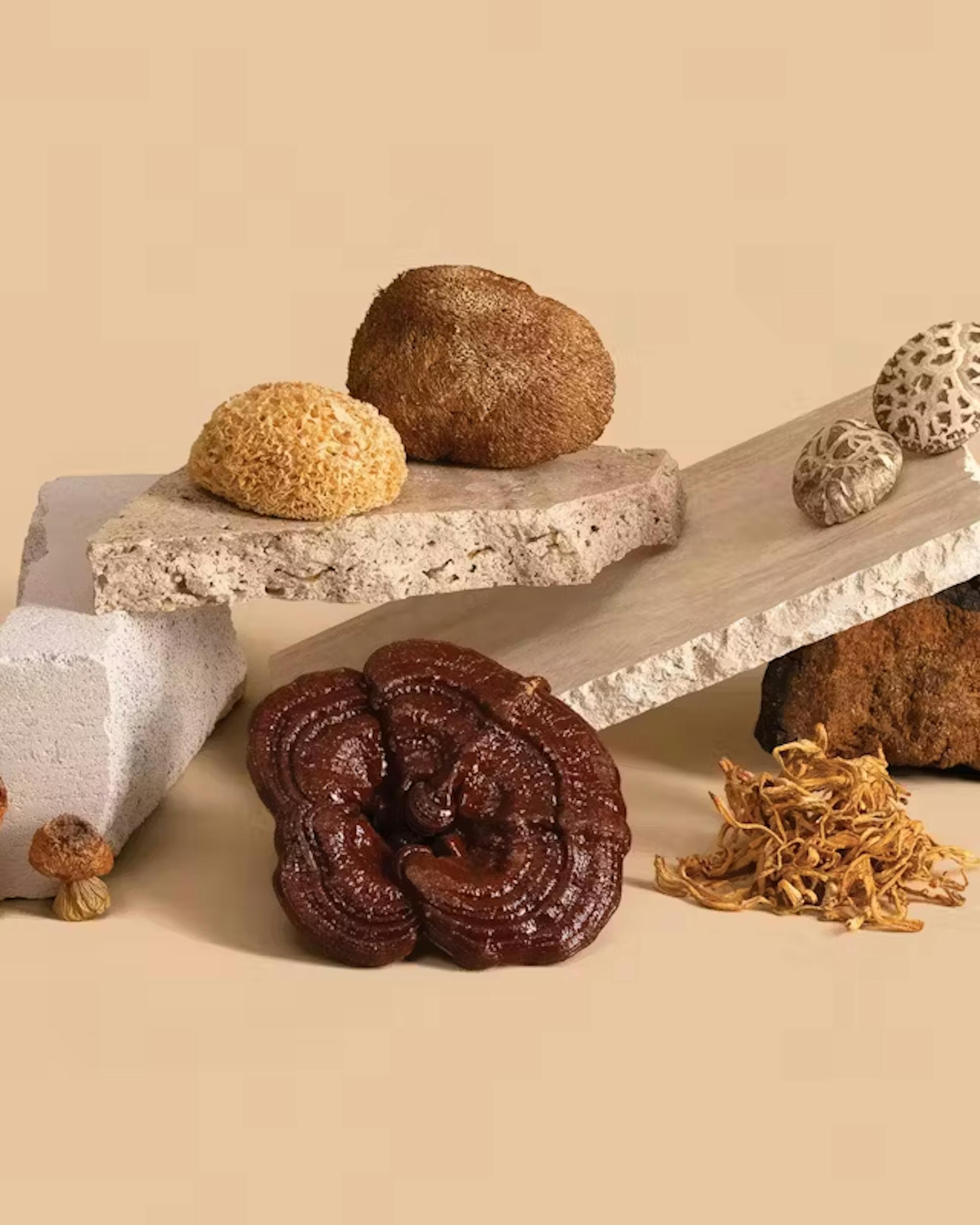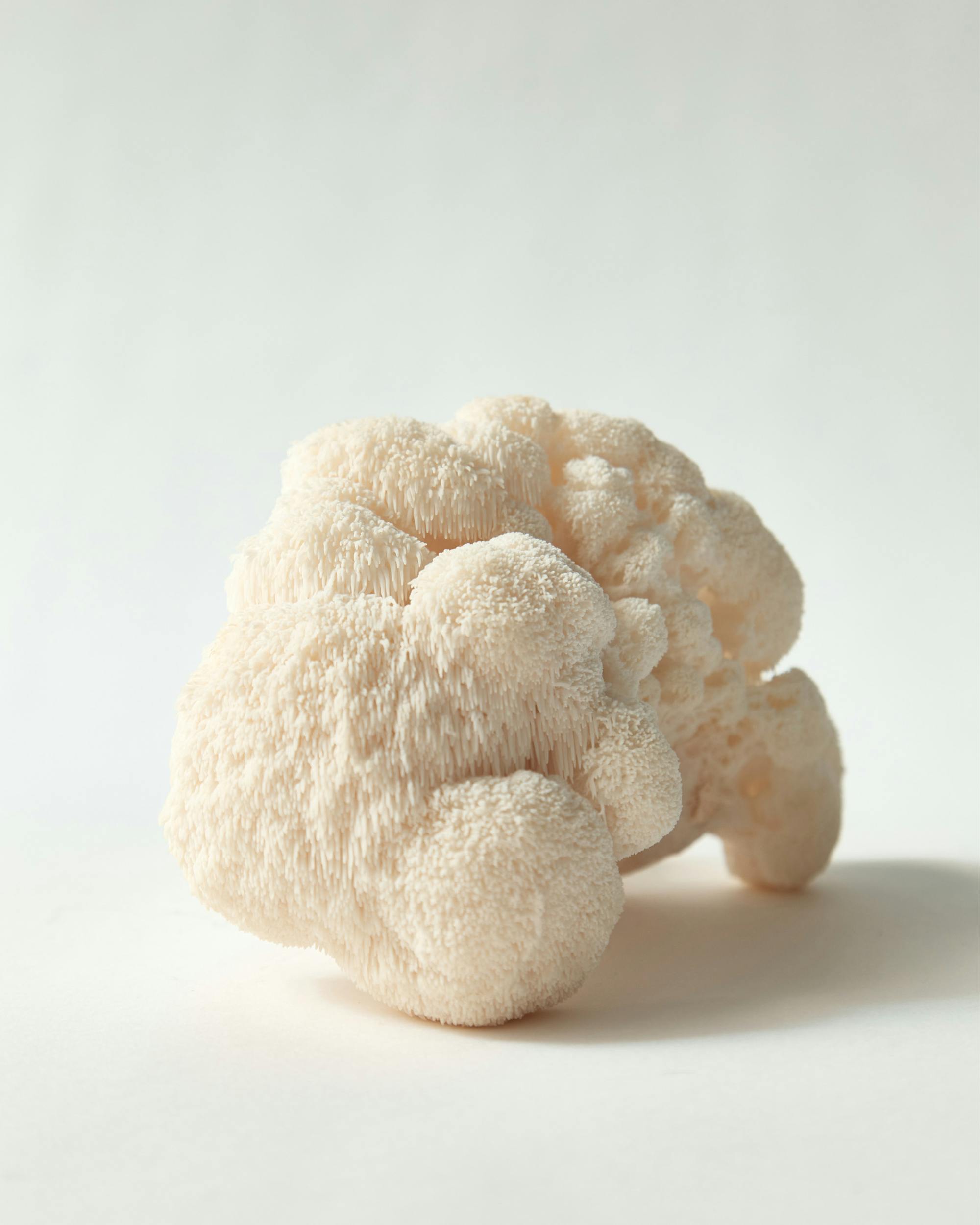0 minute read
To Shroom, or Not to Shroom? A Guide to Medicinal Mushrooms
Fascinating fungi are a zeitgeisty dinner conversation, whether its the creepy Cordyceps variety fictitiously infecting the human race in The Last of Us, or the long-fought victory by mental health campaigners to have magic mushrooms legalised for use as a treatment for depression.
MUSHROOMS OF EVERY SHAPE, SIZE & PERSUASION HAVE HELD A PLACE IN MY PYSCHE SINCE DAY DOT.
Urban myths of small dogs or large toddlers falling ill from their toxic consumption in the botanical gardens.
The magic mushroom in Lewis Carroll's fantasy classic Alice in Wonderland allows our heroine to shrink or enlarge at will (I wish).
One bottomless night in Mont Albert when I watched faded baby pink sheets clipped to the washing line with cobalt peg flicker into otherworldly portals after a sip of mushroom tea.
This handful of awe-soaked mushroom memories is always tinged with an essence of danger, peculiarity… something otherworldly. This is why it makes sense that our post-pandemic selves can’t get enough of them.
Market estimates place the value of the worldwide functional mushroom market at around $23 billion, and with the current mushroom boom, this number is expected to continue rising.
Scientific studies have shown that medicinal mushrooms can be used to improve a wide range of health conditions, including those related to stress and anxiety, immunity, gut health, energy, athletic performance, focus, libido, skin health, and sleep, leading some to predict that they will soon replace CBD as the go-to supplement.

BUT WHAT EXACTLY ARE 'MEDICINAL' MUSHROOMS?
Well, technically, they are macroscopic fungi utilised in the form of extracts or powder for the prevention, relief, or healing of many diseases.
Today, researchers are looking at medicinal mushrooms as a potential source of chemicals with immune cell response-modulating properties.
As a result, they might help boost the immune system's biological response when administered in this way.
And what makes a mushroom ‘medicinal’ and a mushroom ‘magic’?
Psilocybin, the active ingredient in magic mushrooms, is a psychoactive substance that affects the brain and central nervous system. After ingesting the mushrooms, the user will "trip" within 30 minutes. The most prevalent side effects include hallucinations and impaired perception.
The Australian government recently approved the use of these psychedelics for treating severe mental health conditions like post-traumatic stress disorder (PTSD) and major depressive disorder, which do not always respond to traditional therapy or medicines.
The Australian Therapeutic Goods Administration (TGA) issued its decision on February 3 this year to allow the use of MDMA for PTSD that has not responded to treatment and psilocybin for treatment-resistant depression beginning in July 2023. Both are lawfully prohibited otherwise.
So if you fall outside this group but still wish to experience the benefits of mushrooms (medicinal’s version!), here are a few great places to start:
LIONS MANE = BRAIN HEALTH
In China, India, Japan, and Korea, lion's mane mushrooms—also known as hou tou gu or yamabushitake—traditionally have culinary and medicinal functions.
The benefits of lion's mane mushrooms and its derivatives include defence against dementia, alleviation from mild depressive and anxiety symptoms, and prevention of stomach ulcers.

Fungi.era
Lions Mane Extract, 50g
Lion’s Mane Mushroom extract: Think faster. Focus harder.
Lion’s Mane is a mushroom that supports cognitive enhancement and helps whenever you need that extra edge of mental clarity. This powder of fifty grams is an extract of approximately six kilos of fresh lion’s mane mushrooms, extracted down to a pure and potent natural brain booster.
CORDYCEPS = ENERGY
Believe it or not, insect larvae serve as a host for the Cordyceps fungus, a parasitic fungus. These fungi cause tissue replacement and the growth of long, thin stems that branch out from the host after invading it.
Traces of insects and fungi have been utilised in Traditional Chinese Medicine for a long time to cure lethargy, illness, renal disease, and a lack of libido.
Fungi.era
Cordyceps Extract, 50g
Get up and go with cordyceps. Used worldwide for its ability to help us run longer, jump higher, and do more everyday. A true source of ancient power that is best used for physical activity
This powder of fifty grams is an extract of approximately six kilos of fresh cordyceps mushrooms, extracted down to a pure and potent natural source of explosiveness. Our cordyceps mushrooms are traditionally cultivated by hand to give you the best extract possible.
ASHWAGANDA = STRESS
Ashwagandha is a popular herb in Ayurvedic medicine and has been used for centuries in India, the Middle East, and some regions of Africa.
It's commonly referred to as "Indian ginseng." Studies of these ‘magical mushrooms’ effects on cortisol levels and nervous system function have attested efficacy in reducing stress and anxiety.
REISHI = DEEP SLEEP
The reishi mushroom, or Ganoderma lucidum, is a fungus that thrives in the warm, moist climates of several Asian countries. Fresh mushrooms are one option, but dried or powdered forms and extracts containing the relevant compounds are often used to treat anxiety symptoms and promote restful sleep.
Is a friendly alarm currently going off in your head saying that every one of these will be useful? Us, too.
Fungi.era
Reishi Extract, 50g
Reishi mushroom extract: Wind down and find your zen. Reishi has been used for thousands of years in cultures across the world. It promotes relaxation and can help you find rest when none seems to be found.
In asian folklore, it is referred to as ‘the mushroom of immortality’. This powder of fifty grams is an extract of approximately eight kilos of fresh reishi mushrooms, extracted down to a pure and potent natural peacekeeper.
The good news is that you can safely consume more than one strand of mushroom at the same time (but make sure to get approval from your primary care physician first!)
In fact, "mushroom stacking," which is the practice of combining medicinal mushrooms with other adaptogens and antioxidants to boost the benefits, is expected to be one of the most prevalent wellness trends in the year 2023.
Turns out you really can have your shrooms and eat them, too.
Lauren McCurry
Copywriter
Share